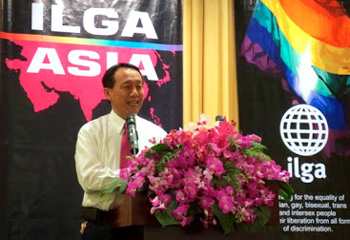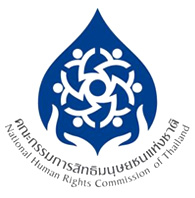Three years ago the fourth ILGA (International Lesbian and Gay Association) Asia conference held in Surabaya, Indonesia was attacked by Muslim fundamentalists. Organizers were forced to cancel the conference just after it started. Many conference participants were left stranded, frightened, and confused by the ugly turn of events in a city not previously associated with religious intolerance.
The fifth ILGA Asia conference was held from 29 to 31 of March in Bangkok, Thailand with a markedly different atmosphere. Themed, “Phoenix Rising,” the opening ceremony of the conference, replete with graceful Thai dancers in silks and brocades and a musical score with the refrain, “Amazing Thailand” was not only a celebration of Thailand’s openness to the lesbian, gay, bisexual, transgender and intersex (LGBTI) people from across Asia who were gathered in Bangkok, but a celebration of transcendence, resistance, and LGBTI perseverance in the face of orchestrated violence and hate.

Dr. Taejing Siripanich, Commissioner of the
National Human Rights Commission of Thailand
Among the opening speakers, Dr. Taejing Siripanich from the National Human Rights Commission (NHRC) of Thailand began his remarks with the question: “Isn’t Thailand amazing?” The audience responded with applause.
The current buzz is that Thailand may become the first country in Asia to legalize same-sex partnerships. I spoke with Dr. Taejing, who is the LGBTI rights point person on Thailand’s NHRC. The Commission has been criticized for being unresponsive to LGBTI concerns and weak on implementation of commitments made to Thai LGBTI people.
Dr. Taejing explained, “LGBTI people in Thailand say that they have lost faith in the Human Rights Commission? They say they cannot depend on us? I say, why don’t we talk? You are a vulnerable group in Thailand. Bring your complaints [of human rights violations] to the Commission so we can investigate.”

In March 2012, at the urging of Thai LGBTI activists, the International Gay and Lesbian Human Rights Commission (IGLHRC) wrote to the Thai government about fifteen brutal murders of lesbians and toms (butch lesbians or transmen) in Thailand, urging the Commissioner General of the Royal Thai Police to investigate the killings and release the findings at a press conference.
The letter was copied to the chair of the Thailand NHRC and to Dr. Taejing. Neither responded. Thai activist and journalist, Paisarn Likhitpreechakul pursued the NHRC for answers and was told, “The incidents appear to be random. There is no pattern of hate crimes,” although the Commission had not conducted an investigation or taken up the matter with the authorities.
I asked Dr. Taejing why hate crimes and lack of anti-discrimination legislation were not being prioritized as same-sex marriage was. “Hate crimes as a concept is simply not acceptable,” he insisted. “But just having a hate crimes law will not give justice. You [victims] have to come to the Human Rights Commission, bring it to our attention, and we will investigate. Don’t wait for a law before reporting. Once we receive the complaints, we will find a channel.” Regarding protections against LGBTI discrimination, he said just as emphatically, “Our Constitution already says everyone is equal. This is our highest law. So discrimination is not allowed. Even if sexual orientation and gender identity is not specifically mentioned, we have the category, ‘sex’. The intention of the Constitution is clear, sexual diversity is protected.”
LGBTI activists at the conference explained that they chose the legalization of same-sex partnerships as a priority for the Thai LGBTI community after the NHRC said it lacked the capacity to get behind multiple issues and the LGBTI community had to choose one priority.
Dr. Taejing said the NHRC is advocating for a new law to be created to legalize same-sex partnerships. He said, “It was easier than changing the existing marriage law because so many other laws are linked to the marriage law. It would take too long to change everything. A new law could state that all rights given to married heterosexual couples must now also apply to same-sex married couples.” To raise public awareness and gauge public opinion about the same-sex marriage proposal, the NHRC has been holding public hearings in major cities in Thailand.
As I listened to Dr. Taejing promise the audience at the conference that he would use his remaining term on the National Human Rights Commission to push for same-sex marriage, I wondered if marriage equality in Thailand would expose the silence around the murders of lesbians and toms. Thus far police have dismissed the killings as “crimes of passion” because of “love gone sour.” Will legalization of same-sex marriage protect LGBTI people from domestic violence and family violence? Will marriage equality change social attitudes that would prevent lesbians and transmen from being sexually assaulted, stabbed or shot multiple times, set on fire, or decapitated by jealous boyfriends, ex-boyfriends and ex-husbands? As Paisarn asks, “Is the right to marriage more important than right to life?”
Background: Thailand’s record at the UN Human Rights Council
In 2010, Thailand was elected to a seat on the powerful United Nations Human Rights Council. Thailand had a history of abstaining from voting in favor of UN resolutions on sexual orientation and gender identity, including a resolution calling for recognition of sexual orientation and gender identity as grounds for extrajudicial killings and executions. Outraged Thai LGBTI activists staged protests in front of the Foreign Ministry to drive home the point that their government should take a stand against the killing of LGBTI people. Thai media coverage further shamed the government. In response, in 2011, Thailand began voting favorably. In 2012, it joined 85 other member states of the UN to vote yes on the first ever UN resolution that condemned violence and discrimination against LGBTI people.
Grace Poore is the Regional Program Coordinator for Asia and the Pacific Islands, at the International Gay and Lesbian Human Rights Commission (IGLHRC). The article was first published on the ILGA website.
For more of Grace Poore’s perspective on LGBTI rights in Asia, watch The Stream: Accepting LGBTs in Asia on Al Jazeera English. Also listen to a statement on Homophobia, Transphobia and Women’s Access to Justice recently delivered at the United Nations. Grace can be reached at gpoore@iglhrc.org











 列印版本
列印版本



















